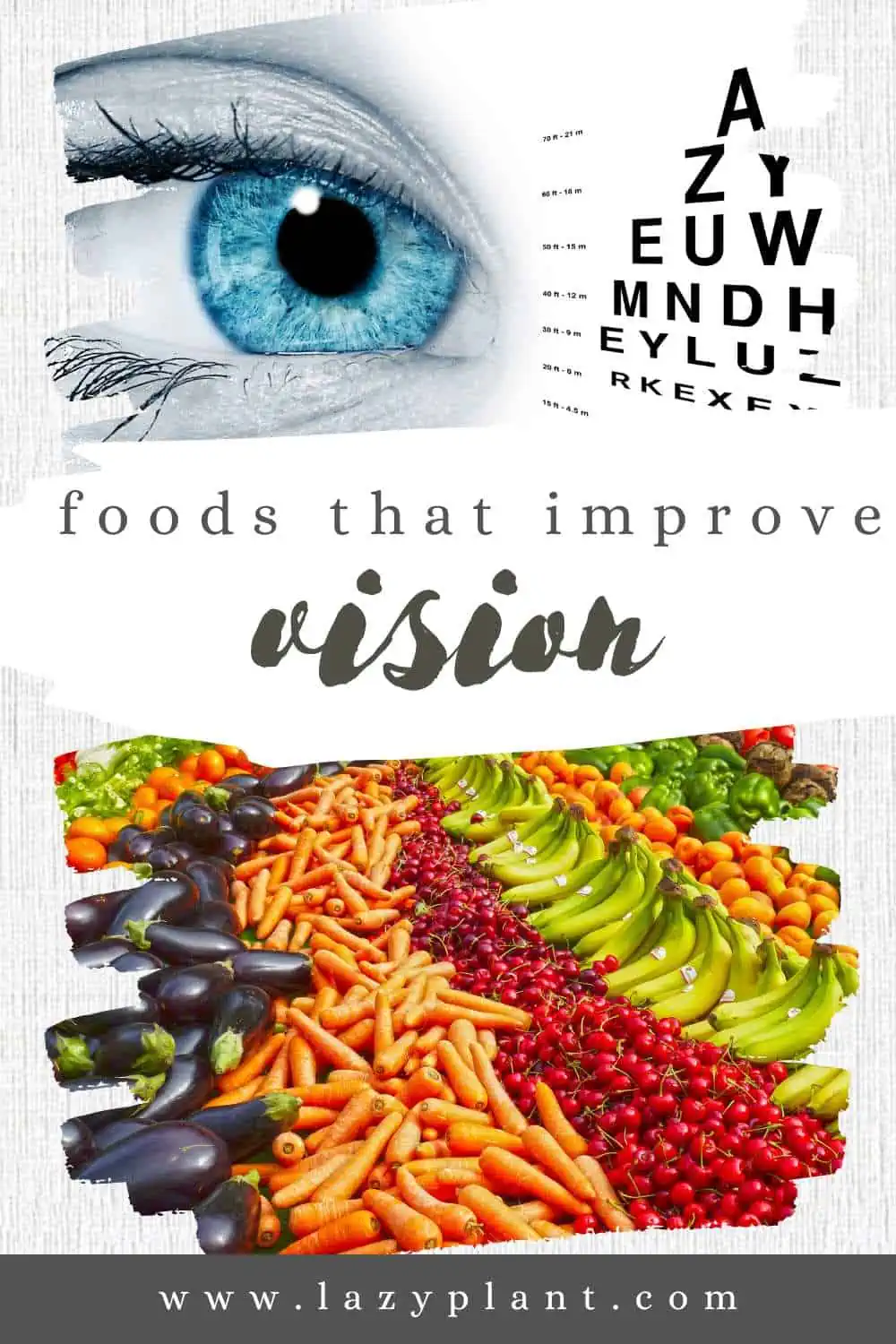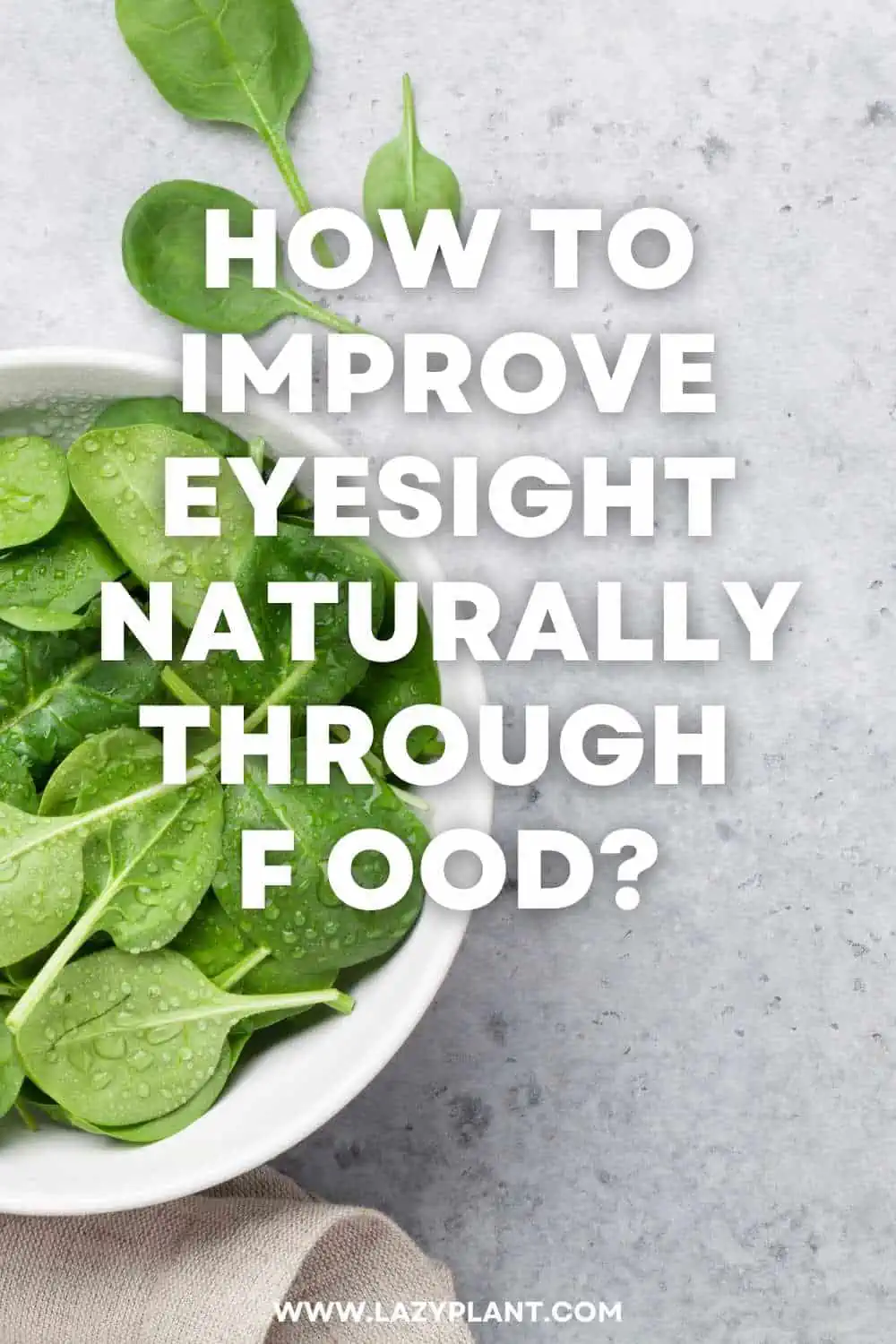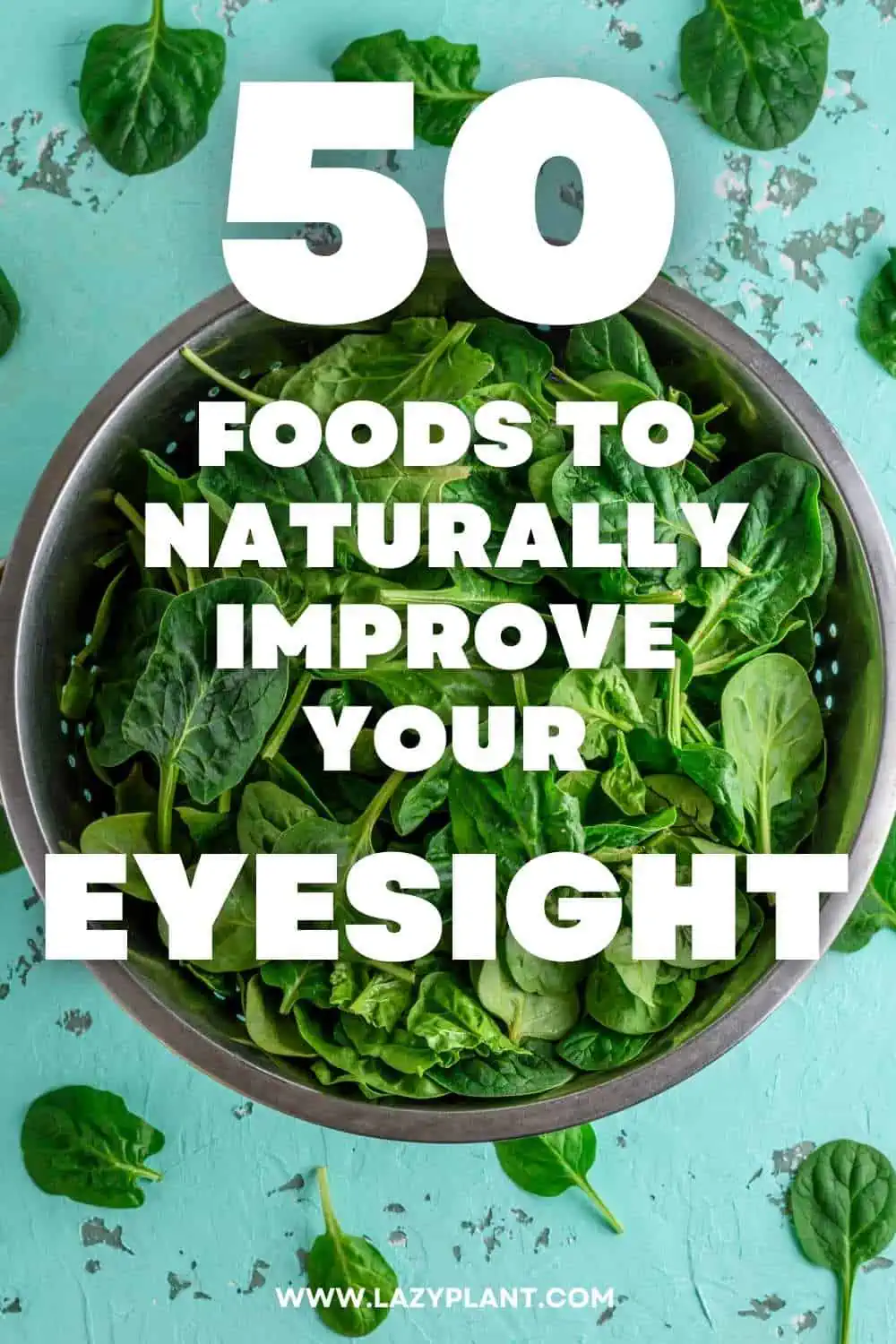Foods rich in vitamins A, C, E, zinc, carotenoids, and healthy fats may naturally protect and improve your eyesight. Other superfoods, like goji berries, ginkgo biloba, saffron, and cruciferous vegetables may have beneficial effects on vision as well.
What food can improve eyesight naturally?
We should consume food rich in:
- vitamin A
- vitamin C
- vitamin E
- zinc
- carotenoids
Lutein & zeaxanthin for good vision
Above all, we should eat plenty of foods rich in lutein and zeaxanthin as well as other carotenoids in order to protect our vision. These powerful compounds have potent antioxidant properties.
Many studies have been conducted for these nutrients and their importance on vision. Most noteworthy, lutein and zeaxanthin are the only carotenoids found in the lens. Also, they are found in the retina of the eye. Furthermore, lutein and zeaxanthin protect the macula by improving pigment density in the retina.
Also, they absorb ultraviolet and blue light. They may also protect against macular degeneration.

Foods rich in vitamin A are good for eyesight
Vitamin A is an essential micronutrient. Our bodies can’t synthesize it. We have to get it from food.
Vitamin A is essential for many physiological processes, such as maintaining the integrity and function of all surface tissues (epithelia) like the eye.
Moreover, vitamin A is essential for vision under conditions of poor lighting.[1]
Vitamin A is important for maintaining your eyes’ light-sensing cells, known as photoreceptors. Actually, vitamins A, C, and E may help prevent the progression of macular degeneration.[2]
There are two forms of vitamin A:
- preformed vitamin A (retinol and retinyl ester), which it’s derived from animal sources
- provitamin A (beta-carotenoid), which it’s derived from colorful fruits and vegetables
Good animal-based sources of vitamin A are the liver, egg yolk, and dairy (milk, cheese, butter).
Meat isn’t a good source of vitamin A. However, the liver is the richest food in vitamin A. A serving contains more vitamin A than the maximum safe dose!
Plant-based sources contain vitamin A in the form of carotenoids. Dark leafy vegetables are among the richest foods in carotenoids.
Actually, peppers, carrots, squash, turnip greens, peas, spinach, collard greens, sweet potatoes, dill weed, cress, beet greens, kale, cabbage, amaranth leaves, broccoli, arugula, and brussels sprouts are good for your vision, as they’re particularly high in carotenoids.
| Vitamin A (IU) per 100g | |
| Peppers, pasilla, dried | 35,760 |
| Carrots, raw | 16,706 |
| Apricots, dehydrated | 12,669 |
| Squash, winter | 11,155 |
| Turnip greens | 10,765 |
| Spinach, raw | 9,377 |
| Collards | 9,183 |
| Sweet potato | 9,169 |
| Poke berry shoots | 8,700 |
| Spices, marjoram, dried | 8,068 |
| Dill weed, fresh | 7,718 |
| Cress | 6,917 |
| Beet greens | 6,326 |
Spices, such as marjoram, bay leaf, savory, tarragon, and thyme are particularly rich in vitamin A as well.
Many fruits can protect your vision, as they contain adequate amounts of carotenoids as well. Apricots, mangoes, papayas, cherries, peaches, oranges, olives, grapefruits, gooseberries, black and red currants, figs, blackberries, blueberries, grapes, and apples are also great dietary sources of vitamin A.
| Vitamin A (IU) per 100g | |
| Apricots, dehydrated | 12,669 |
| Persimmons, Japanese | 1,627 |
| Passion-fruit, purple | 1,272 |
| Grapefruit | 1,150 |
| Plantains, yellow | 1,127 |
| Mangos | 1,082 |
| Papayas | 950 |
| Cherries, red | 870 |
| Ground cherries | 720 |
| Tangerines, or mandarin oranges | 681 |
| Peaches | 532 |
| Orange peel | 420 |
| Rowal | 383 |
| Olives | 330 |
| Gooseberries | 290 |
| Orange juice | 264 |
Other foods for better eyesight
Moreover, goji berries, ginkgo biloba, saffron, healthy fats, and cruciferous vegetables (sulforaphane) support good eyesight.
Goji berries are rich in antioxidants. They contain zeaxanthin, which is important for the good function of retina.

Ginkgo biloba may protect our vision as well. Its extract can act as an antioxidant. It may protect the eye during light exposure.[3]
Saffron is a spice, used for its aroma and wonderful deep red color. Researchers found that saffron may protect photoreceptors from retinal stress, maintaining both its morphology and function.
Also, you should consume cruciferous vegetables for better eyesight. They’re particularly rich in sulforaphane. This compound is very promising for improved eyesight. Common cruciferous vegetables are broccoli, brussels sprouts, kale, watercress, cabbage, arugula, cauliflower, collard greens, and turnip greens.[4]
In addition, you should consume healthy fats (seeds, nuts, olive oil) because they improve the absorption of carotenoids. Foods rich in omega-3s can protect your vision as well. Fish oil, certain seeds, and walnuts are the best dietary sources of omega-3 fatty acids.
Moringa Powder
Moringa powder protects your eyes because it’s the richest food in beta-carotene! It contains about 28.5 mg of beta-carotene per 100g.[5]
It’s also the richest food in lutein and zeaxanthin. Moringa powder contains about 36 mg of lutein and 5.5 mg of zeaxanthin per 100g.
Moringa powder is rich in vitamin E as well, containing around 155 mg of vitamin E per 100g. A tablespoon of moringa powder may provide up to 10.8 mg of vitamin E or 72% of the DV.
Vitamin C
High levels of vitamin C are necessary for good vision. Actually, vitamin C is concentrated in all eye tissues. Moreover, vitamin C is vital for the health of blood vessels, including the delicate capillaries in the retina of the eye.[5]
Above all, vitamin C is a powerful antioxidant. Antioxidants protect the eye from oxidative stress due to air pollution, sunlight, or smoking!
Actually, antioxidants play a key role in AMD development. According to a study, people at high risk of developing age-related macular degeneration (AMD) who received antioxidants had a 28% lower risk of progression to advanced AMD.
In addition, vitamin C is necessary for the synthesis of collagen. Collagen is the main protein of the body. It provides structure to the eye. Especially, in the cornea and sclera. Low collagen synthesis could be a reason for the development of cataracts.[6]
High doses of vitamin C may reduce the risk of Cataracts
There are many studies that have linked high doses of vitamin C and decreased risk of developing cataracts. A daily dose of at least 300 mg of vitamin C seems beneficial for good eyesight.
According to studies, vitamin C intake greater than 300 mg per day can reduce the risk of cataracts by 70%. On the contrary, daily doses of 120 mg from supplements didn’t significantly lower the risk of developing cataracts.
You may need higher doses of vitamin C, if you smoke, have diabetes, or take drugs. These are risk factors for cataracts, as they deplete the eye’s lens of vitamin C.
Vitamin E is also beneficial for lowering the risk of cataracts. Especially, when combined with vitamin C. Both are powerful antioxidants. We can safely take a daily dose of vitamin E up to 400 IU from supplements.
Vitamin C helps people with AMD
Age-related macular degeneration is closely associated with nutrition. People at high risk of developing AMD can benefit from taking 500 mg of vitamin C a day. This dosage, along with beta-carotene, vitamin E, and zinc, can slow the progression of advanced AMD by about 25%.
We can get these high doses of vitamin C by following a plant-based diet. Fruits and vegetables are the best dietary sources of vitamin C.

Zinc
In addition, the most important mineral for good eyesight is zinc. Eyes have high concentrations of zinc. Actually, zinc is involved in the formation of visual pigments in the retina.
Common foods high in zinc are sesame seeds, pumpkin seeds, squash seeds, mustard seeds, sunflower seeds, lentils, chickpeas, walnuts, peanuts, almonds, and cashew nuts.
Water
Last, but not least, we have to drink plenty of water. Water hydrates, lubricates and cleans the eye.
Foods bad for your vision
As a rule of thumb, avoid foods with a high Glycemic Index and foods high in saturated or trans fatty acids.
A diet high in poor vegetable oils and food high in glycemic index increases the risk of age-related macular degeneration (AMD). On the contrary, healthy fats (omega-3s) may lower the risk of AMD.
In addition, too much salt may be bad for your vision. It may cause high blood pressure, which may impact your eyesight. Blood vessels in the retina can be damaged.